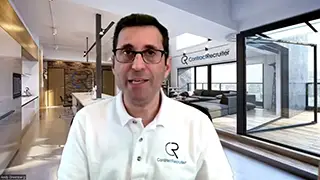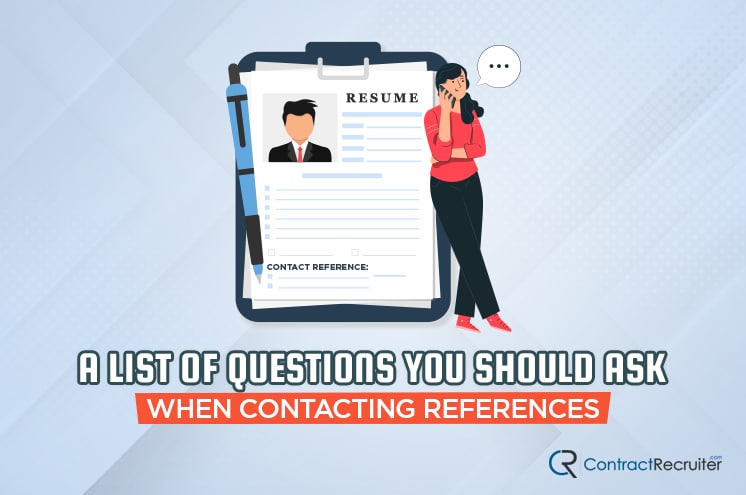Many people are used to adding references to their resumes, and those references are never contacted. Entry-level jobs are notorious for this, which is why so often references are either simply friends and family or left out entirely and “available upon request.”
This leaves many people unprepared to list actual professional references or to be the references. So, when an individual starts applying for jobs where references are important and taken seriously, this is often a sticking point for many candidates.
As an interviewer, it’s your job to sort through references, pick the right people to call, and ask the right questions. A considerable part of that is asking the right questions and asking the same questions between references to verify answers. There will, naturally, be some variation between different references. However, the core character traits and attributes you’re looking for should remain constant.
If you’re unsure of what questions to ask these references, we’ve got you covered. Here are the most important questions you can ask and why.
What You Can’t Ask
Before we start, let’s go over some things you shouldn’t ask. Generally, anything you can’t ask about in an interview is also something you can’t ask about in reference checks.
You can, however, ask more than many people believe.
“A common misconception is that it’s illegal to ask references for information beyond anything confirming that the candidate did work for the company for the period they claim to have worked.
This misconception arises from the widespread use of “no reference” policies by companies, which usually bar current employees from giving out anything but the barest information on current and past employees.
There are no federal laws preventing them from giving you more info on your candidate, just company policies aimed at reducing the risk of liability for discrimination and/or defamation.” – Checkster.
Generally, the things you can’t ask about are protected class information. Information relating to race, religion, gender and sexual identity, national origin, age, disability, and other protected information is grounds for a discrimination suit if you ask about it and then don’t hire the individual.
There may also be state-level laws that add further restrictions on what you can and can’t ask of references. It’s worth double-checking a resource (like this one from Nolo) to see what can and can’t be asked.
Typically, if you keep your questions aimed at verifying what’s on a resume, verifying work history, and discussing performance, you’re better off than asking about any personal or non-work attributes.
Now, let’s get down to the questions to ask.
Questions for Professional References
The bulk of your reference checking should be done through professional references. You don’t care – and often can’t ask about – the things your candidate does in their off-hours. It doesn’t matter what their hobbies are; if they prefer to hang out at a bar, go hiking in the mountains, or exercise at the gym all day; it’s not relevant to their performance on the job. These are the sorts of questions you should ask professional references, like previous managers and coworkers.
Verify information.
This first “question” encompasses a series of questions meant to verify information on the resume. These questions include:
- “When did the candidate work for your company?”
- “What was the position the candidate worked in your company?”
- “Does the job title and description offered by the candidate match your records?”
- “Did the candidate have any performance, tardiness, or attendance issues?”
- “Was the candidate promoted while at your company?”
- “Why did the candidate leave their previous role?”
There are some other questions you may be able to ask, as well. For example, you can potentially ask about starting and ending salary for the candidate. Be aware, however, that some states have laws against asking for salary history, so double-check this before you ask.
Some of these questions can be asked but not elaborated on. For example, you can ask about tardiness, but asking why the user was tardy or absent might not be acceptable, particularly if the reason has something to do with a protected category of information. Since it can reflect medical issues, family issues, or other problems that you aren’t allowed to use as the basis of a hiring decision, it’s better to avoid asking for clarification in the first place.
What was it like to work with the candidate on a day-to-day basis?
This question prompts the reference to discuss the candidate’s daily performance. Depending on their relationship, you may get answers relating to their general attitude, productivity, trustworthiness, how seriously they take their job, and how they fit in with their company culture.
These answers can give you an idea of how they might mesh with your existing team.
What are the candidate’s greatest strengths?
This question allows the reference the opportunity to point out perks and benefits of the candidate. Two things can happen here; they can verify what the candidate has already said about themselves and add additional characteristics to the list. Sometimes, the reference might contradict what the candidate has said about themselves.
That isn’t necessarily enough to call one party a liar; different people have different perspectives. Try to watch out for blatant contradictions, however.
What were the candidate’s biggest areas of opportunity?
This question is rather carefully phrased. If you ask about the candidate’s weaknesses or their “needs improvement” areas, you risk the reference clamming up. They don’t want to open themselves up to a defamation suit if they say something that was, for example, never documented.
This can, in some cases, even end the reference call as the reference is no longer willing to be open with their opinions. You can get better answers by phrasing it in a more positive light (“areas of opportunity”).
Did the candidate work well as part of a team, or did they prefer to work solo?
This question can indicate how well the candidate can fit in with your organization’s structure. Some companies are fine letting employees do their own thing, as long as their work gets done. Others are highly social, highly collaborative, team-based environments.
An employee who thrives in one might not work well in the other, so it can be a good idea to know how they worked in their previous job.
Did the candidate supervise or manage any employees? How would they describe the candidate’s management style?
This question applies only to candidates who had people reporting to them. It can give you insight into the leadership and management styles of the candidate, but will by necessity, be a partial perspective.
You may consider asking for information about those direct reports to then contact them, but you might not need to. And, of course, if the employee didn’t manage or supervise anyone, it’s a moot point.
What was the candidate’s biggest accomplishment while working for your company?
This question allows the reference the opportunity to gush about something the candidate did that was influential, high-profile, or highly effective. Maybe they helped close a major sale, were the key to developing a new product, streamlined a business process, and saved the company a lot of money, or they were highly reliable and effective at their job.
Not everyone needs to be a superstar, but a reference should have at least one positive story to tell.
Would you hire the candidate again if the opportunity arose?
This is a significant question to ask. If the reference would hire the candidate again, this can be considered a good sign; they’re valuable and effective and provide real benefit to their team. Conversely, if the reference would hesitate or not hire the candidate again, it can indicate a problem. Maybe they didn’t mesh with the company, or they were sub-par in their performance.
At the same time, the answer might be “no” because “they’ve grown beyond the scope of what our organization can provide.” This answer is a good thing! While the candidate is valuable, the reference understands that they would grow dissatisfied and leave again if re-hired. Always ask about the context for this question, especially for negative answers.
Is there anything you would like to share that I haven’t asked about?
This is an excellent final question for a reference. It’s open-ended, and it allows the reference the opportunity to bring up something – positive or negative – that they think should be influential to the hiring decision.
Typically, this will be positive, if anything at all; most professional references won’t say something negative to avoid putting themselves at risk. Still, it can be good to ask.
Questions for Personal References
Generally, you don’t want to interview personal references for mid and high-level jobs. Friends and family may be able to give insight into the personal lives and habits of the candidate, but they aren’t going to be indicative of their performance on the job. Many people code-switch between their home life and their work life and can appear to be very different people depending on whether they’re on or off the clock.
That said, personal references can still provide some helpful information. Additionally, they may be more open about what they say because they’re not operating under a professional agreement or a company policy, and they’re not trained to be managers or give information properly (in general).
How do you know the candidate?
This question is a good opener for a suspected personal reference to establish their relationship.
Friend, family, acquaintance, business partner; many non-work relationships can provide valuable insight, but some can’t.
What would you say are the candidate’s strengths and weaknesses?
By listing strengths and weaknesses together, you invite the reference to provide both, rather than listing strengths and ignoring weaknesses. This answer can give you helpful information about where the candidate may need improvement.
Of course, a personal reference will have a different perspective on a candidate, and the weaknesses (and strengths) might not translate well to the working environment, so this question may need interpretation.
Can you describe a stressful situation the candidate went through and how they handled it?
This question can be very tricky to ask. On the one hand, it’s a good idea to ask about how the candidate handles stress.
On the other hand, this can get construed as asking about the source of that stress, which can be protected information like medical conditions, which can put you or the reference in hot water. Be careful with this one.
What words would you use to describe the candidate?
In this case, you’re looking for general descriptors, like “dependable,” “driven,” “successful,” and “tenacious.”
These can indicate a candidate who is willing to face problems head-on and work at them until they’re solved, which is generally a good thing for an employee.
How would you describe the candidate’s communication skills?
This question is asking about two things: speaking and listening. Is the candidate an effective communicator? Do they speak well with peers, with bosses, with friends? Or do they tend to shut down and withdraw in stressful situations? Also, how well do they listen, do they practice active listening, and can they retain the information they hear? These are all good qualities in the workplace.
By asking these questions of the references your candidate provides, you can better understand how they will fit into your company and the role you’re looking to put them in. The references should verify what the candidate and the interview have already told you in most cases. It’s only when something stands out as wrong, contradictory, or egregious that you should start digging further.
There are other reference considerations as well. For example, if you’re hiring for a governmental agency, you may have additional concerns or restrictions on what you can ask. There’s a lot to consider with references, but taking them seriously is essential for ensuring you hire the best possible candidate.
Have any questions or concerns about what to ask a candidate’s reference? Please feel free to drop a comment down below, and we’ll get a conversation started! A lot can go into a successful reference call, so it’s essential to understand what you’re doing, and we’d be more than happy to help out however we can.















